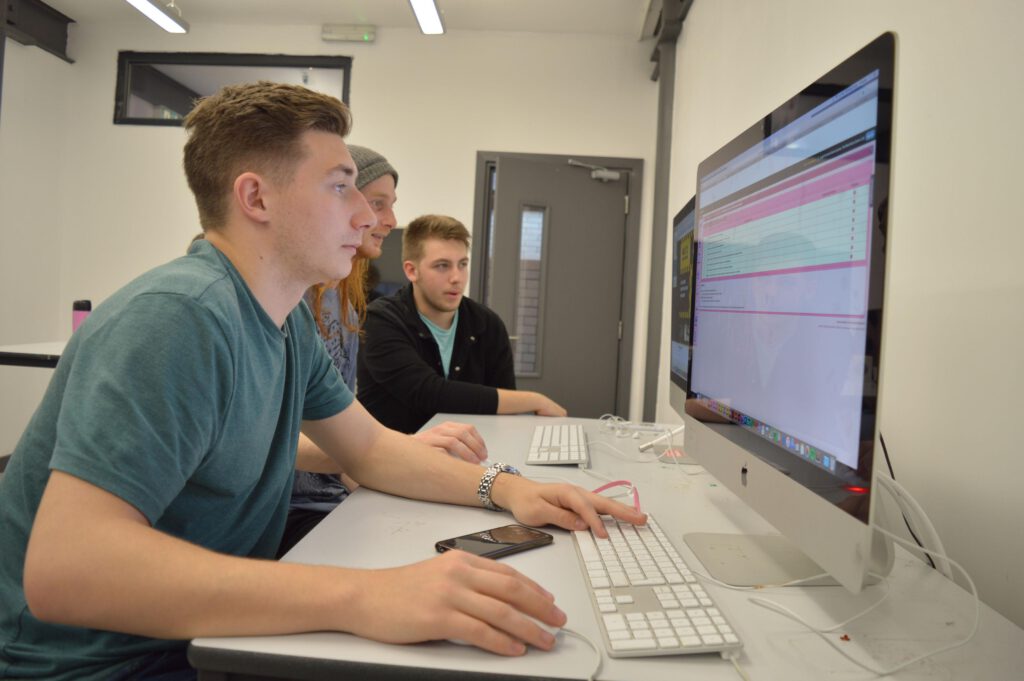New college careers scheme to plug digital skills gap

A new college careers initiative is addressing teachers’ lack of understanding about the digital industries and the shortage of up-to-date information on how college leavers can get digital jobs.
Digital Advantage was set up in response to feedback from creative and digital employers who think the national curriculum and college careers advice is failing to equip FE students with the skills and experience needed to fill thousands of digital jobs.
Employers report that colleges do not have the technical know-how, latest careers information or work experience links needed to prepare students for common roles such as web design, advertising, software development, marketing, social media, mobile technology and e-commerce.
Earlier this month MPs from the House of Commons Science and Technology Committee warned that the UK needs another 745,000 workers with digital skills by 2017.
The ‘Digital Skills Crisis’ report identified that the skills gap costs the economy around £63bn a year in lost income.
Action needed on digital skills crisis |
|
The Science and Technology Committee has published a Report (13 Jun 2016) warning that the UK risks being left behind if the Government does not take more action to address the Digital skills crisis. |
Report findings |
|
12.6 million adults in the UK lack basic digital skills; 5.8 million people have never used the internet; only 35% of computer teachers in schools have a relevant degree and 30% of the required number of computer science teachers have not been recruited; and 13% of computer graduates are still unemployed 6 months after leaving university.
The gap between digital skills possessed and digital skills needed demonstrates a long-running weakness in the UK’s approach to this crisis. |
The Committee is calling for: |
Science and Technology Committee Chair, Nicola Blackwood MP said:
Digital strategyThe MPs question why the Government has taken so long to produce the long-promised ‘Digital Strategy‘ and call for it to be published without further delay. The Committee warns that the Strategy needs to go further than merely listing cross-government digital activity, but present a vision for the future delivered by collaborative work from all involved:
|
Digital Advantage is working with over 500 students aged 16-18 from 20 colleges and schools in Greater Manchester and Lancashire. It has developed a two-term digital enterprise course that brings industry experts into colleges to teach the latest digital employability skills and provide real-world careers advice.
Twenty four hours of teaching and mentoring helps young people to understand the digital industries and give them the skills they need to get into it. The course has been designed by industry to help students develop new business ideas, use the latest digital technologies, create portfolios of their own work and improve core skills in communication, team work and problem solving.
Teachers receive training on how to prepare students for the digital workplace and integrate digital skills development into existing lessons. Students benefit from work place visits, inspirational talks from industry experts and, this year, the chance to win a £5,000 start-up prize for creating a digital business.
The scheme encourages students to consider an apprenticeship in the creative and digital industries rather than going to university. It aims to help 16-18 year olds secure well-paid, entry level digital jobs, straight from college.
Every student that completes Digital Advantage’s course is guaranteed an interview with a digital company for one of over 200 apprenticeships in the North West region.
Jackie Holt, managing partner at communications agency BJL and the IPA’s (Institute of Practitioners in Advertising) North West City Head said:
“As both an agency head and a mum of a 14 year old boy, I’m very impressed by the opportunity that Digital Advantage brings to colleges, schools, teachers, kids and even parents. Colleges and schools need to forge better links with working environments, showcasing the type of real-life challenges that their pupils are going to face in 2-3 years. Teachers need support to be able to deliver that insight and knowledge so initiatives that provide real briefs can be inspirational. Kids are exposed to working collaboratively, under pressure and importantly with a competitive perspective – something that they definitely will face in the working world.”
Andy Lovatt, managing director of The White Room, which delivers Digital Advantage said:
“We want to show high achieving students that university isn’t their only option. Creative, technical and business brains are desperately needed right across digital industry. Students that get apprenticeships through Digital Advantage will benefit from high quality work experience, respected qualifications and good starting salaries; giving them a head start in the digital industries over young people coming out of university.”
Digital Advantage is funded by the Greater Manchester Combined Authority, City Deal Apprenticeship Hub Funding.












Responses